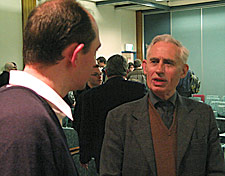
An internationally renowned Oxford don has defended his theory that the resurrection of Jesus is 97 per cent likely before a critical university audience.
Oxford University's Professor Richard Swinburne uses probability theorems and logic in his book "The Resurrection of God Incarnate' to demonstrate the rational nature of the gospel message.
Speaking at the University of New South Wales (UNSW) on Thursday night, the Christian philosopher found not every listener would accept the basis for his argument.
"I think if someone didn't accept that there was a God and that the Bible was true they wouldn't have taken his argument seriously," says audience member Lynn Boxwell.
However, others found faith supported by rational argument an attractive proposition.
"I found it useful for applying to some situations in life where people are struggling with issues as to why God would send his son to save humanity," says another attendee, Luke Buckle.
The lecture, hosted by the Centre for Apologetic Scholarship and Education (CASE) at UNSW, also made space for the case for unbelief.
Imran Aijaz, a non-Christian Philosopher of Religion from Auckland University says he is sceptical of Swinburne's expectations of how God would act to save the world.
"One of the things I'm quite sceptical about is one's ability to speculate about what God would and wouldn't do through pure rational thought," Mr Aijaz says.
"I find it very, very strange that people would think that if there were a God then you would expect him to do this or this or this"
Likewise, UNSW student Luke Wolstencroft says the Professor's argument relied too heavily on a "modernist perspective'.
"The separation of reason and rationality from emotion and faith undermined the strength of his argument," Mr Wolstencroft says.
But Professor Swinburne believes the heart has to give way to the mind.
"I want justification for my faith," he admits.
"Why should I believe in Jesus rather than Muhammad rather than Scientology?
"You can't just believe in things. You've got to have some reason for believing in things."
And even his opponents were prepared to accept the strength of his reasoning.
"What we heard from Professor Swinburne was not a case of "just believe because the Bible said so' but a very clearly rationalised argument," says Mr Aijaz.
"Even at the end of the day if you don't agree with the conclusion you have to respect the fact that a rational argument was put forward."
So does Professor Swinburne believe he can argue someone into the Kingdom of God?
"God's grace through his Holy Spirit can operate in many different ways," he concluded at the end of the evening.
"It can give people direct awareness of God; it can also help them to see that arguments work."
Visit the CASE website for information on upcoming events and courses.
























